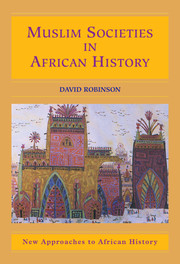Book contents
- Frontmatter
- Acknowledgments
- Contents
- LIST OF MAPS AND FIGURES
- INTRODUCTION
- PART I The Historical and Institutional Background
- PART II General Themes
- 3 The Islamization of Africa
- 4 The Africanization of Islam
- 5 Muslim Identity and the Slave Trades
- 6 Western Views of Africa and Islam
- PART III Case Studies
- CONCLUSION
- GLOSSARY
- INDEX
3 - The Islamization of Africa
Published online by Cambridge University Press: 05 June 2012
- Frontmatter
- Acknowledgments
- Contents
- LIST OF MAPS AND FIGURES
- INTRODUCTION
- PART I The Historical and Institutional Background
- PART II General Themes
- 3 The Islamization of Africa
- 4 The Africanization of Islam
- 5 Muslim Identity and the Slave Trades
- 6 Western Views of Africa and Islam
- PART III Case Studies
- CONCLUSION
- GLOSSARY
- INDEX
Summary
Obviously Islam was born outside of the continent. Its key institutions developed in the early centuries in areas that we call the Near or Middle East. But the faith spread into Africa – quickly into some regions and societies and more slowly into others. Today about half of the people living in the continent profess Islam, and almost 25 percent of the Muslims of the world live on the continent. This chapter deals with the spread and profession of faith in Africa, whereas the next chapter deals with the ways in which African societies have appropriated Islam.
I talk about islamization and africanization to suggest that at least two processes were at work: first, the extension of something that Africans and outsiders would recognize as Islam, and second, the “rooting” of that faith in Africa. In fact, as this book shows the processes were much more complex than that, because we are dealing with a 1,400-year period, a huge continent, and millions of people. For most of that time most of those people have not identified themselves as African, but by smaller names for regions or ethnic groups, such as Swahili, Mandinka, or Berber, or indeed entities much smaller than that.
Note that I use the term islamization, not arabization. Arabic was the language of revelation of God to Muhammad and consequently the language of the sacred book, the law, and prayer. After several centuries it became dominant in North Africa and much of the Sahara.
- Type
- Chapter
- Information
- Muslim Societies in African History , pp. 27 - 41Publisher: Cambridge University PressPrint publication year: 2004



